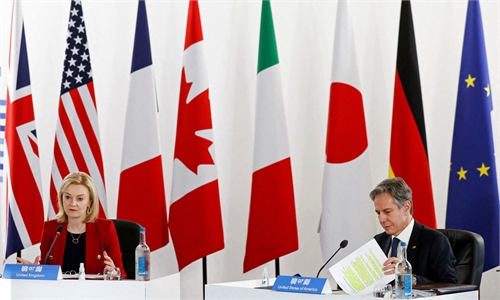
Illustration: Liu Rui/GT
While UK politicians may think that trumpeting ideological rhetoric against China could help them expand trade and security cooperation with its allies, the US in particular, they are actually undermining a potentially huge space for economic and trade cooperation with the world's second largest economy.During a speech delivered at the Lowy Institute of Australia on Friday, UK Secretary of State for Foreign, Commonwealth and Development Affairs Liz Truss mentioned China several times, blaming China for exerting "economic coercion" and "working more closely with Russia".
In response, the Chinese Embassy in the UK warned that British diplomacy, if always following the Cold War playbook written by the US, will go nowhere, according to a statement published on the embassy's website on Sunday.
One of the goals of Truss' visit to Australia was to strengthen bilateral economic and trade ties with Canberra. But Truss's remarks make people wondering whether she could talk about UK cooperation with an ally without mentioning China.
From an economic point of view, if the UK's economic and trade policy always caters to the US in the same way as its diplomacy, there is reason to start worrying about the country's trade prospects.
Ever since leaving the EU, the UK has appeared eager to jump onto the US-led anti-China bandwagon, showing an inclination to deviate from its past political sophistication. To a certain extent, such deviation reflects the rising uncertainty and anxiety of politicians in the UK toward the post-Brexit future, as they seem desperate to find a footing in Europe and in the world.
To become a "special ally" of the US, the UK now aspires to stand at the front of the US' containment strategy against China. For instance, it has heightened the risk of nuclear proliferation in the Asia-Pacific by joining a security partnership with Australia and the US, which is known as AUKUS. And it has repeatedly pointed fingers at China's internal affairs and launched malicious assaults on issues concerning the Xinjiang region and Hong Kong.
The UK has the right to develop economic and trade cooperation with any country, but there is no need to involve political factors in the economic relationship with China, just because of its political alliance with the US, which is set to harm its own interests in the end.
Vince Cable, a former business and industry minister of the UK, said recently that the UK's decision to ban Huawei's 5G equipment and services "had nothing to do with national security", and it was taken because of the pressure from Washington. The decision has seriously affected the 5G rollout in the country in terms of the delayed schedule and increased investment costs.
The example again shows that if Britain's foreign and trade policies continue to be influenced by the US, Downing Street will be further dragged away from its "Global Britain" vision. With the global economy slowly recovering from the coronavirus pandemic, it is essential for the UK to embrace multilateral cooperation with countries including China to make real economic progress at home.
In fact, there is a huge need for mutually beneficial cooperation between the UK and China, as evidenced by the bilateral trade that set a new record in 2021. Moreover, the two countries also share room for cooperation when it comes to tackling global challenges, including climate change and counter-terrorism. Following the heels of the US and stirring up ideological fight with China will do no good to London, and will only hurt UK interests.



